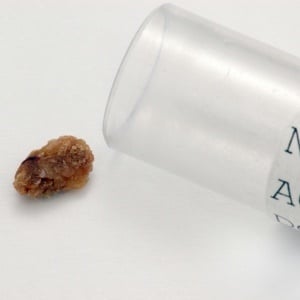
There are five different types of kidney stones and it is important to know which of the five you might have.
- Calcium oxalate stones are the most common. They tend to form when the urine is acidic, meaning it has a low pH. Some of the oxalate in urine is produced by the body. Calcium and oxalate in the diet play a part but are not the only factors that affect the formation of calcium oxalate stones. Dietary oxalate is an organic molecule found in many vegetables, fruits, and nuts. Calcium from bone may also play a role in kidney stone formation.
- Calcium phosphate stones are less common. Calcium phosphate stones tend to form when the urine is alkaline, meaning it has a high pH.
- Uric acid stones are more likely to form when the urine is persistently acidic, which may result from a diet rich in animal proteins and purines-substances found naturally in all food but especially in organ meats, fish, and shellfish.
- Struvite stones result from infections in the kidney. Preventing struvite stones depends on staying infection free. Diet has not been shown to affect struvite stone formation.
- Cystine stones result from a rare genetic disorder that causes cystine-an amino acid, one of the building blocks of protein—to leak through the kidneys and into the urine to form crystals.
Why is knowing which type of stone a person has important?
Knowing the chemical makeup of the stone helps the doctor identify why the patient is prone to stone formation. The kind of stone a person's body makes determines what dietary changes may be needed. For example, limiting oxalate in the diet may help prevent calcium oxalate stones but will do nothing to prevent uric acid stones. Some dietary recommendations may apply to more than one type of stone. Most notably, drinking enough water helps prevent all kinds of kidney stones.
How does a doctor determine the type of kidney stone?
If a person can catch a kidney stone as it passes, the doctor can send the stone to a laboratory for analysis. For stones that are causing symptoms, the doctor may also retrieve a stone surgically or with a scope inserted through the urethra into the bladder or ureter.
The doctor will also order tests to look for unusual levels of chemicals such as calcium, oxalate, magnesium, and sodium in the blood and urine to help design a prevention strategy.
(Source: National Institutes of Health, NIDDK, February 2013)




 Publications
Publications
 Partners
Partners















